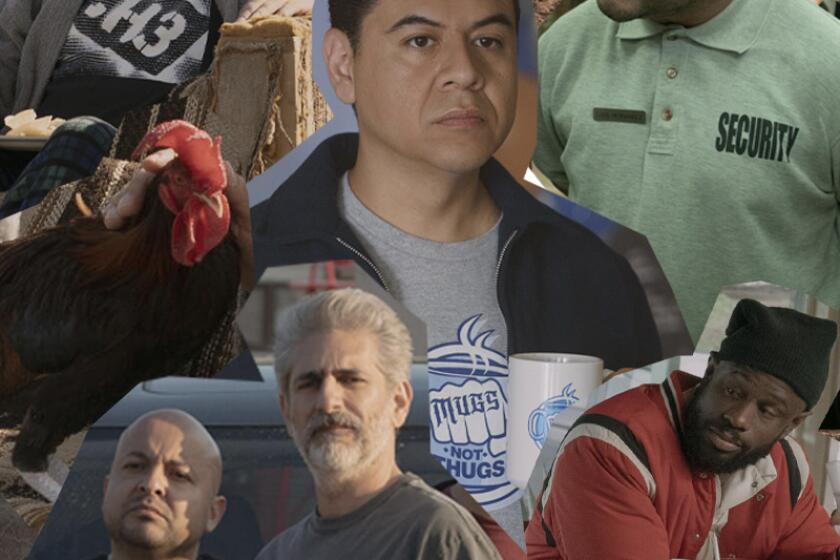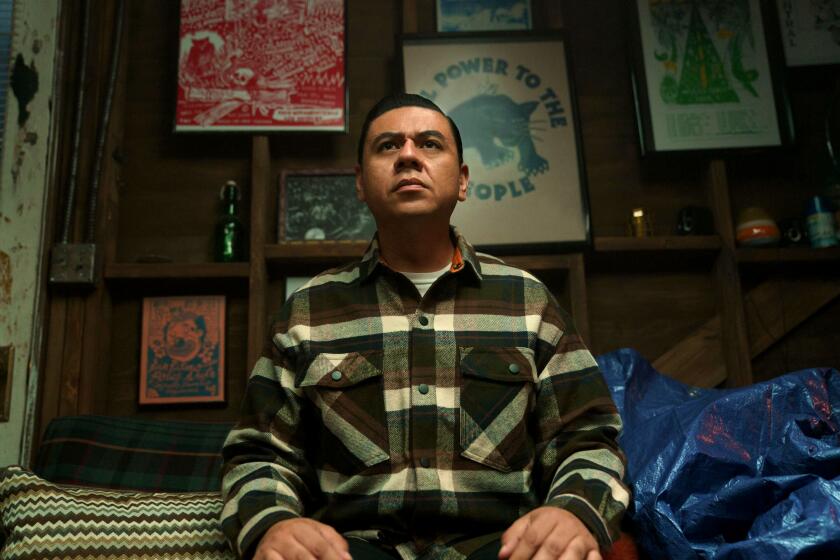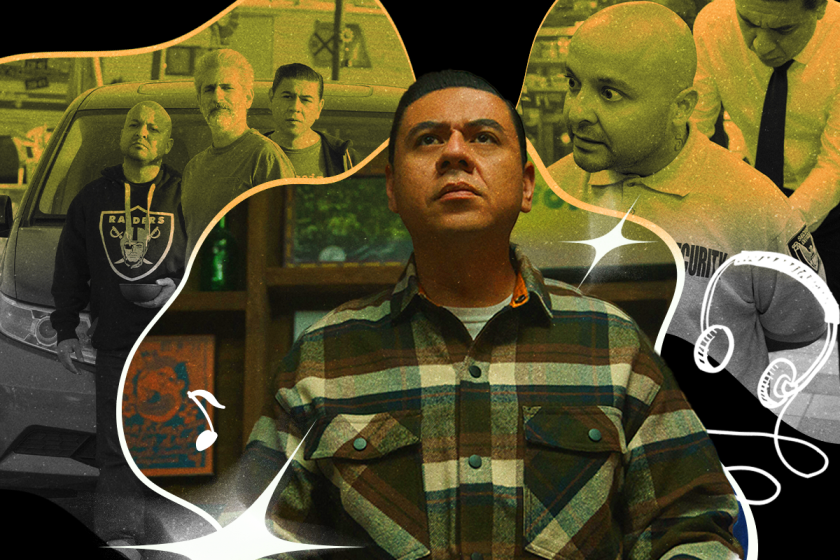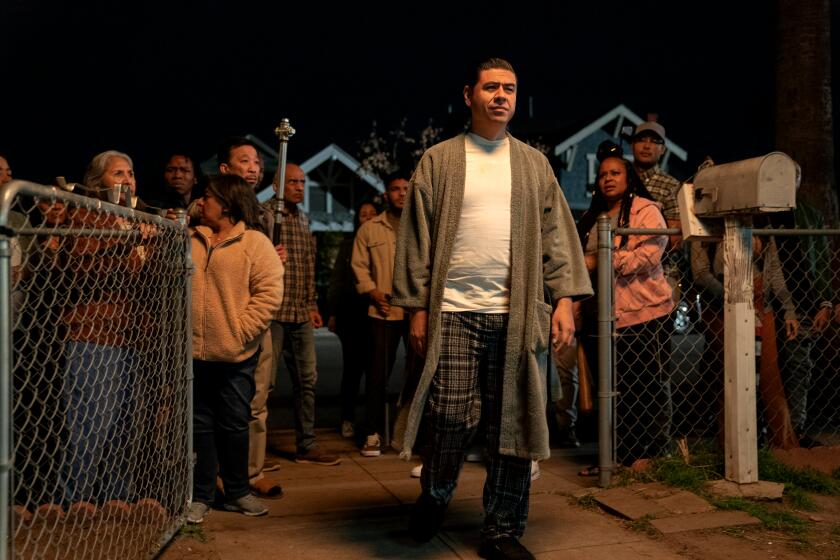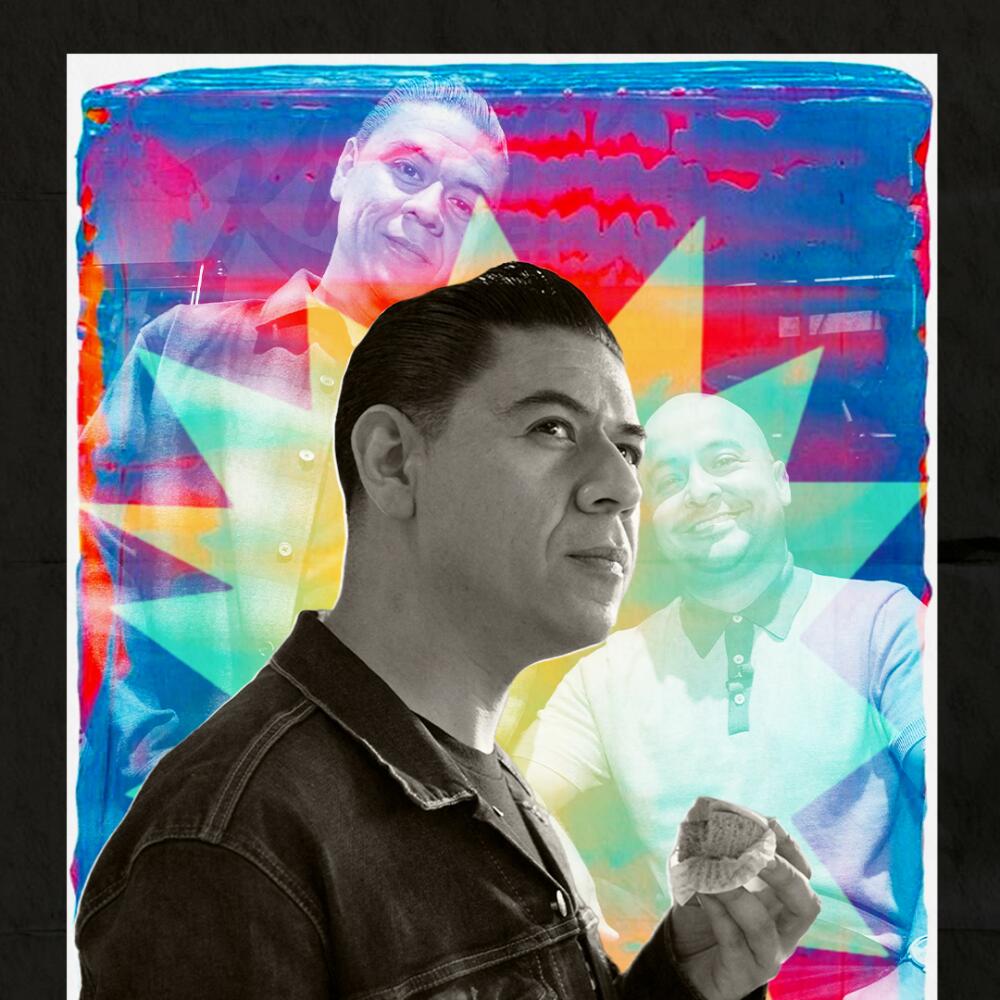
- Share via
Last week, comedy nerds and wearers of Nike Cortezes got hit with some devastating news: Hulu had canceled the comedy “This Fool” after two seasons.
The series— created by Chris Estrada, Jake Weisman, Pat Bishop and Matt Ingebretson— stars Estrada and Frankie Quiñones as oft-warring cousins in South L.A. following the release of Luis (Quiñones) from prison. Through fantastical moments of magical realism nestled into perfect encapsulations of ’hood life, viewers got a story of two fools trying to figure out their place in the world. And in doing so, Estrada and company made something special that represented Latino life in L.A. in a way that resonated far beyond those confines.
“This Fool” relied on word-of-mouth after it premiered in 2022. A year later, it’s having to do the same.
“I think getting to film in L.A. and having L.A. feel like a character in the show was really cool,” said Estrada. “To hear people who don’t live in L.A. or never been to L.A. say the show resonated with them made me feel like, ‘Cool, you don’t have to live in L.A. to appreciate the show.’”
Though Hulu has yet to release a statement (and has not responded to De Los’ request for comment) about the show’s cancellation, “This Fool” received widespread critical acclaim but struggled to build an audience through COVID and the writers’ and actors’ strikes. Fans are rallying online to #SaveThisFool, however, and Estrada is taking the news with a positive spirit.
The following interview has been lightly edited for length and clarity.
Well, first off, I’m really sorry.
Oh, it’s OK! It’s unfortunate, but I had a suspicion that it might happen. The way me and my friends that I co-created this show with — Jake Weisman, Pat Bishop and Matt Ingebretson — we always doubled down on our vision. Every season we treated it like our last, just because we know the industry. You just never know what to expect. When we wrote the first season, we said, “Let’s write it like it’s our last!“ And then when we wrote the second season, we said, “Let’s write it like it’s our last!“ [laughs]
The actor-comedian talks about the new season of the Hulu series based loosely on his life and his desire to present working class people authentically.
You seem to be really Zen about this.
I guess I’m trying to be Zen about it because I’m trying not to take it too personal. I know it’s just the state of the TV industry and film, post-strike. I think a lot of these companies lost a lot of money. I think they’re just cutting shows that aren’t their biggest shows. But believe me, I was definitely bummed.
It would be hard not to be.
To be quite honest with you, I felt like it was coming, so I had a little bit of a grieving process up until I got the news. But when I got the news, I was pretty bummed. But I was grateful. I got to do two seasons of a TV show. That’s crazy.
I think the scary thing was, where do I go from here? I’m a stand-up comedian, but I also love writing and making things. So I’m like, I guess I’ll keep doing stand-up because it gave me this opportunity and I never stopped doing it. I have to keep creating and keep going. I know I’m not the first person this has happened to.
From hardcore punk to Mexican regional to oldies, the soundtrack of the second season of ‘This Fool’ has everything.
It really is a next-level awful time in Hollywood.
Yeah, it really is. I think we were affected by not being able to promote. I wanted to adhere to the strike rules. I’m a proud SAG and WGA member. I understood that the fight is bigger than one show or anybody. I think two things are true: that the strike was incredibly important, and I’m grateful that it happened, and I’m grateful that our unions got a lot of what they wanted. And, I also think not being able to promote might’ve affected us.
It really goes to show you, there’s so much stuff that has to align perfectly. So much has to go completely right.
Absolutely. So much of it has to align in a way that’s out of your hands. In a certain sense, it’s almost out of your hands how much it has to perfectly align. It’s crazy, but I have to remind myself that I chose this. Aside from being a comedian, I was a fan of TV and filmmaking, so I had heard all the stories. I try to kind of put it in perspective by remembering that I chose to be a part of this.
It’s hard because we choose something and we know there’s going to be a lot of challenges. There’s going to be a lot of heartbreak. But you still have moments of, “Does it have to be this hard? Does it have to have this much heartbreak?“
It’s such a complicated beast. As disappointed as I feel, I also feel proud of the two seasons we made. I especially feel really proud of that second season. I think, tonally, it’s what I’ve always wanted the show to be. I think if we only made one season, I’d be more disappointed than I am.
It seems more and more, getting a Season 1 is like winning the lottery. To make it to Season 2 is beyond.
That’s why, in a rough sense, I don’t want to sound like a sore winner. I feel grateful. Hulu took a chance on me, and I got to make two seasons of the show. I’m really hoping that the show just keeps being watched and discovered by new people in the way people did with “Party Down” or “Arrested Development.” I’m hopeful that it becomes part of a cult classic fandom.
The show’s untimely end brought the same reaction as previous cancellations, but the problem is as much with Latino viewers who failed to watch as it is with Hollywood.
Is there anything on the show you got to do that you’re really stoked that you got in?
I was able to sneak my mom into the show. In Season 2 there’s an episode called “Los Personas Invisables.” It’s about the character Esperanza retiring from her job. The scene opens up with a retirement party. Unfortunately, my mom didn’t get to have one because she got COVID the week of her retirement. So we put her in as featured background in that, which felt really cool to do.
You got to give her her retirement party in a way!
That was like that’s the least I could do after putting her life on blast.
Filling the show with all these different people from your life in one way or another, as characters or in the background, must have been so exciting.
Yeah, that was really cool. It’s almost a blur, to be quite honest with you. I felt incredibly fulfilled creatively doing it. I couldn’t have asked for a better experience. It’s hard because by nature writing and making TV is hard, but it’s also fulfilling when you’re able to do it your way, and luckily, they let us do it our way. I’m glad we did it our way instead of having a third season that we got because we compromised so much on the first two seasons.
It really is inspirational for a lot of people trying to do the same thing as you in Hollywood, who don’t have parents in Hollywood and all that.
That really means a lot to me. I don’t come from the Harvard School of TV comedy. My mom was a janitor. Up until a few years ago, I was working at a warehouse and I was a stand-up comedian. I always wanted to work in the industry. It seemed so impenetrable if you don’t come from that world, but I was able to penetrate it through being a stand-up comedian. I’m also grateful I never stopped doing comedy. I still have a job. [laughs]
Alex Zaragoza is a television writer and journalist covering culture and identity. Her work has appeared in Vice, NPR, O magazine and Rolling Stone. She’s written on the series “Primo” and “Lopez v. Lopez.” She writes weekly for De Los.
More to Read
The Latinx experience chronicled
Get the Latinx Files newsletter for stories that capture the multitudes within our communities.
You may occasionally receive promotional content from the Los Angeles Times.
